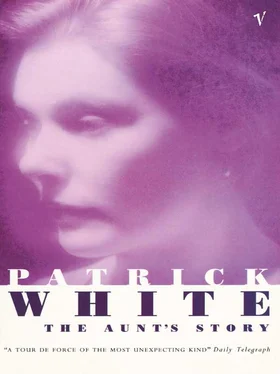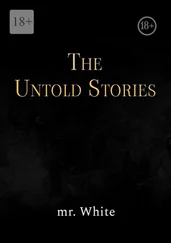Presently she went down through the trees to the place where the spring ran. She sat beside the brown water which welled out of the rusty tin, full of frog spawn and the skeletons of leaves. She decided that she would wait here for Holstius, where the formation of the land gave her a certain amount of protection, where the light and shade, tree and grass broke her body into less obvious shapes. Anyway, out of the house. Now she suspected the house. Man would be very admirable within his own freckled limits, if it were not for his native slynesses, and, more particularly, his desire to strain perpetually after truth. It was this which had led him to fix the roof of the house, propped like a lid on a stick. Twitched from a distance by a cord, the stick would fall, and the lid imprison the unsuspecting victim. So Theodora avoided the house and the subtlety that Mrs Johnson had prepared.
She stirred the water, squinting through the light at her hand, which still wore its flesh.
‘Ah,’ she breathed sharply, shading her eyes, and the water ran startlingly over the surface of her hot skin.
She had heard the boots squeak among the trees. She saw the flash of the hat, because today he was wearing a Panama which still disguised his face. His clothes were the same stiff daguerreotype. His expression had not yet evolved out of the shadow of the hat.
‘Why are you sitting here?’ he asked.
‘Because I was afraid, I suppose,’ she said humbly.
She turned her face aside, to minimize its foolishness. But she did not expect censure. She was too calm.
Holstius sat down. He looked at his hands, which were calloused from driving horses.
‘You will go back up to the house,’ he said. ‘Did you know?’
‘Yes,’ she said, or mumbled. ‘I suppose I knew.’
There was nothing that she did not know, only this had to be laid bare painfully. Holstius laid his hands on, and she was a world of love and compassion that she had only vaguely apprehended. Leaves glistened down to the least important vein.
‘They will come for you soon, with every sign of the greatest kindness,’ Holstius said. ‘They will give you warm drinks, simple, nourishing food, and encourage you to relax in a white room and tell your life. Of course you will not be taken in by any of this, do you hear? But you will submit. It is part of the deference one pays to those who prescribe the reasonable life. They are admirable people really, though limited.’
Theodora nodded her head to each point she must remember.
‘If we know better,’ Holstius said, ‘we must keep it under our hats.’
She would pin on it the big black rose, of which only Zack, of all the Johnsons, had sensed the significance.
Then Theodora sighed.
‘It has been interesting,’ she said, ‘and at times lovely.’
‘It has been? It is ,’ Holstius said. ‘Your sense of permanence is perverted, as it is in most people. We are too inclined to consider the shapes of flesh that loom up at us out of mirrors, and because they do not continue to fit like gloves, we take fright and assume that permanence is a property of pyramids and suffering. But true permanence is a state of multiplication and division. As you should know, Theodora Goodman. Faces inherit features. Thought and experience are bequeathed.’
In the peace that Holstius spread throughout her body and the speckled shade of surrounding trees, there was no end to the lives of Theodora Goodman. These met and parted, met and parted, movingly. They entered into each other, so that the impulse for music in Katina Pavlou’s hands, and the steamy exasperation of Sokolnikov, and Mrs Rapallo’s baroque and narcotized despair were the same and understandable. And in the same way that the created lives of Theodora Goodman were interchangeable, the lives into which she had entered, making them momently dependent for love or hate, owing her this portion of their fluctuating personalities, whether George or Julia Goodman, only apparently deceased, or Huntly Clarkson, or Moraïtis, or Lou, or Zack, these were the lives of Theodora Goodman, these too.
‘So you understand?’ asked Holstius, looking down from the shade and calm of his Panama hat, for there was no wind to stir it.
‘Yes,’ said Theodora Goodman. ‘I understand.’
She had worked it out, mathematically, in stones, spread on the ground at the toes of her long shoes.
‘So that it will not be so irksome,’ Holstius said.
‘No,’ she agreed.
She could accept the pathetic presumption of the white room.
‘I should go then,’ he said. ‘Up to the house. Because they will arrive soon.’
Theodora stood up and hitched round her skirt, which had slipped askew. This way we abandon the dangerous state of music and achieve the less distracting positions of sculpture.
‘I shall go then,’ she said.
She swept back a dark shadow from her face with her quite solid hand. Out of the rusted tin welled the brown circles of perpetual water, stirring with great gentleness the eternal complement of skeleton and spawn.
For this reason Theodora Goodman did not thank, or think much more about Holstius. In the act that she was performing, walking up the slow hill towards the house, his moral support was assured. Now his presence was superfluous.
At the corner of the house she stopped to finger tentatively the spikes of a thistle. Because she had heard the car again. So she looked from beneath her eyelids, like a child, and waited, and touched the cruel spikes.
The car stopped in the clearing in front of the house. From round the corner she could just see. She could see the car, boiling over from the hill, and the last spasms of its self-importance. There were three people in the car, she could see. There was Mrs Johnson. Of course. There was Mr Johnson. Less expected. And there was a mild man in spectacles. His skin was exceptionally mild as he got down out of the car. Theodora knew that his eyes would be full of subtle sympathy. But she could not see these yet. The sun was striking the metal rims of his spectacles.
‘Here we are then, Doc,’ said Mr Johnson, who showed no great inclination to leave the car.
It was obvious that Mr. Johnson had been brought there against his will, to share in something that he did not care to share, that it was unmanly to avoid, but which he would, if given a chance. So he sat sideways and laughed shortly, to halve his share, as it were, and to reveal his manliness. At the same time Theodora realized that the withdrawn and muscular Mr Johnson, who had his own dark moments, as he had shown her by his silences and certain positions of his body, and who had even reproduced his shadow in one dark child, this same Mr Johnson would not be her ally.
Still, she sighed, and touched the thistle, it is often like that.
‘So this is where Kilvert lived,’ said the mild man, for something to say.
Mrs Johnson, who had been having trouble with the door, her side of the car, now tore it open.
‘That’s it,’ said Mrs Johnson. ‘And where this crazy Annie has chosen to live now.’
Mrs Johnson’s words hurt her. Sometimes she had to make her own words hurt, until she felt the smarting of her eyes. Because Mrs Johnson suffered, excessively, from an excess of tenderness. For this reason she was hard.
‘She’s not crazy all the time,’ her husband said.
‘Lucidity,’ said the mild man, ‘isn’t necessarily a perpetual ailment.’
Johnson, who might have protested, forced himself to wonder whether he had driven home the bar in the corral gate before leaving. He grunted at the other man, and chewed grass.
Mrs Johnson had come forward. With determination she crossed the clearing. She came and stood in the lower room of the house. She called.
‘Miss Pilkington?’ she called.
Читать дальше












